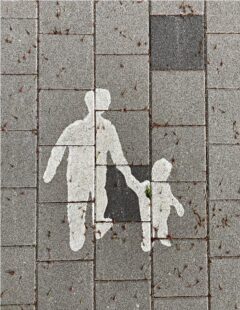Mental Health Help for Children of Divorce
Dr. Aryn Ziehnert
 No one wants their marriage to end in divorce. But unfortunately, divorce does happen for various reasons. It takes time for the adults involved to grieve the end of the relationship and move on. The same is true for children of divorce. Younger children, under two, may have an easier time transitioning to a new setup between parents.
No one wants their marriage to end in divorce. But unfortunately, divorce does happen for various reasons. It takes time for the adults involved to grieve the end of the relationship and move on. The same is true for children of divorce. Younger children, under two, may have an easier time transitioning to a new setup between parents.
Grade school children and older might have more difficulty adapting to the new lifestyle and changes. Unfortunately, without help, children’s mental health can suffer if they don’t know how to manage their thoughts and emotions.
You can help children of divorce by following a few of the strategies below.
Tips for helping children of divorce.
Children of divorce can feel overwhelmed and torn between their parents. They want to please both parents, which can cause family issues. Children might also be loyal to a parent they feel was unjustly hurt and lash out at the offending parent.
On the other hand, children of divorce may blame themselves for the separation or blame the parents for the turmoil and upheaval of their lives. Helping your child adjust is a priority. Taking extra time with them and listening to their worries is the first step to showing that you care and that everything will work out for the best.
Listen to your children.
It’s easy to assume your children play a lesser role in a divorce or to neglect their opinions about matters since the divorce is between two adults. However, children need to know that the adults in their lives care about them and what they think.
Your child probably cannot have a say in the major things like where you will live, how you will co-parent, or your new work schedule. But you can ask for their input on the smaller topics, such as what color they want their bedroom painted or how you should decorate a room. Even something simple like asking them what they would like for dinner later in the week can help.
Not only should you ask for (and value) their input, but you should also ask about their school life. Has anything changed? Are they doing well, or do they need extra help? What about their friendships? The more you know about their daily lives, the easier it might be to notice any potential areas of concern.
When your children know you are honest with them, they are more likely to show vulnerability and open up to you about their worries, concerns, and fears regarding the divorce.
Reassure your children.
 Children can believe that the divorce is their fault. Although the separation is between adults and is about adult problems, children can still view every argument, comment, or look as a result of something they did.
Children can believe that the divorce is their fault. Although the separation is between adults and is about adult problems, children can still view every argument, comment, or look as a result of something they did.
Reassure your children that the divorce and the marital problems are between you and the other parent and that this was an adult decision. Let your children know that you love them and that you are always available for them to talk about anything.
Sometimes children fear losing one (or both) parents after a divorce. This is because the parents live in two separate households, and often, a single parent must work extra hours or a second job to make ends meet, leaving less time to spend with the children. If that is the case, try to make what time you have quality time, doing things together as a family.
Acknowledge their feelings.
Divorce can feel like the loss of a loved one. Even if your co-parent arrangements have you with the child 50% of the time and your ex-spouse has them for the other half of the time, the child still does not have both parents home. The family life they have always known has changed.
Help your child by acknowledging their feelings about this change. They may need to go through the grieving process for the family unit they once had, the home they lived in, or the loss of relationships with extended family.
 For example, if you have sole custody of your child due to domestic violence, they may miss their other parent and childhood home. Even if the decision to leave was necessary, this could still be difficult to understand for a child. Younger children may again blame themselves for a parent’s behavior.
For example, if you have sole custody of your child due to domestic violence, they may miss their other parent and childhood home. Even if the decision to leave was necessary, this could still be difficult to understand for a child. Younger children may again blame themselves for a parent’s behavior.
Allow your child to go through the grieving process and get them professional help if needed. The grieving process has five stages: denial, anger, bargaining, depression, and acceptance. Unfortunately, your child can get stuck in one stage for too long or cycle through the stages repeatedly. A counselor can be helpful in this situation.
Develop a new routine.
Children need routines to thrive and feel safe and secure. Even independent children need to know what comes next in their day and what adults they can rely on for support. If possible, try to stick to your child’s original daily routine. For example, take them to school or the bus stop. Ask about their day while making dinner. Maintain bath and reading time before bed.
You may feel guilty for having to take a firm and proactive role in their life after the divorce. But enforcing your rules only shows that you care about their well-being. If you must change the daily routine, inform your child of the changes. You will need to stay as flexible as possible until you find a new schedule that works for your family.
For example, if your younger child was used to both parents tucking them in at night, let them know that you will be doing that now and express your excitement about spending that time with them, reading books, and talking about their day. Share that every new routine change is a benefit.
Find time for fun.
Life can feel hard during and after a divorce. Everything feels serious. Take time for fun. Spend days with your children doing things that you all love. For example, on your days off, plan activities like a picnic in the park, a drive through a state forest, schedule a movie night, play board games, or buy an inexpensive inflatable pool and relax outdoors. Choose a mix of activities that are free and low-cost.
 The important thing to remember is that you are making memories. Your children will not remember what you spent at the zoo but that you took them. Likewise, children are not concerned with what foods you pack for the picnic when they spend the day hiking, fishing, or playing on a playground. But they will tell their children one day about the trip they took with you or the times they curled up with you on the couch watching family movies or television shows.
The important thing to remember is that you are making memories. Your children will not remember what you spent at the zoo but that you took them. Likewise, children are not concerned with what foods you pack for the picnic when they spend the day hiking, fishing, or playing on a playground. But they will tell their children one day about the trip they took with you or the times they curled up with you on the couch watching family movies or television shows.
Find activities that get you all excited. If you have more than one child, alternate whose turn it is to choose the activity. Choose one day a week or month to engage in family fun time.
Seek help for yourself.
Your children’s mental health concerns you, but are you taking steps to protect your mental health? Children should never be a sounding board for everything that went wrong in the marriage. Instead, it would be best to have someone else in your corner.
A divorce is a life event. It can coincide with a new job, home, or career. If you co-parent, you may miss having your children seven nights a week.
These are not easy changes to accept. Sometimes you need help to get through the divorce process and the emotions that bubble up from time to time. Meeting with a counselor enables you to get those thoughts and feelings out into the open.
Protecting the mental health of children of divorce.
Your child’s health is your priority. Protecting children of divorce mentally and emotionally can be challenging during this season of grief and upheaval. Let us help you make the transition smoother.
Contact your office today to schedule an appointment with a family counselor. Your counselor specializes in family issues, including divorce, and can present you with methods and strategies to improve your children’s lives, so they thrive during this season.
“Broken Link”, Courtesy of Jackson Simmer, Unsplash.com, CC0 License; “Little Queen”, Courtesy of Senjuti Kundu, Unsplash.com, CC0 License; “Sidewalk Graffiti”, Courtesy of Suzi Kim, Unsplash.com, CC0 License; “Parent and Child Silhouette”, Courtesy of Ante Hamersmit, Unsplash.com, CC0 License






